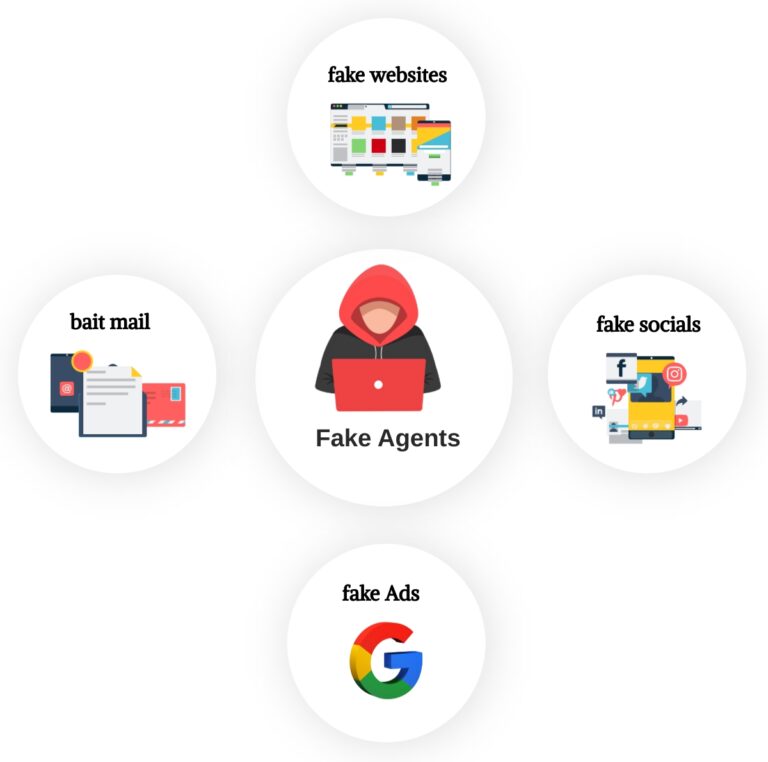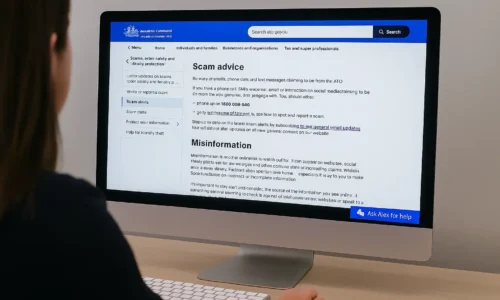

Fake University Recruitment Agents: How to Spot Scams
Fake university recruitment agents are becoming a growing threat to students, particularly international students in Australia. These scammers pose as legitimate education consultants, promising quick admissions, guaranteed placements, or discounted tuition fees. In reality, they exploit students with false promises, upfront fees, and fake documents that can cause serious financial and reputational harm. Understanding how fake university agents operate — and knowing the warning signs — is essential for protecting yourself from education scams.
Real versus a Fake university agent
Agents are compensated by the university for their efforts to recruit suitably qualified students. They are often registered and accredited by the University to conduct their work.
Fake agents are not registered or accredited and do not have a formal relationship with the university they claim to represent. They are often not qualified to provide advice and their intent is to either de-fraud the student or send them to an educational institution not related to the target university.
How do the fake university agent scams work?
Fake university recruitment agents operate through a coordinated, multi-channel strategy designed to capture students wherever they turn for information. They set up fake websites, impersonate universities on social media, send convincing bait emails, and exploit private messaging apps to make direct contact. At the same time, they manipulate Google search and paid ads to push their scams into view. This web of deception traps students at multiple points in their research journey, ultimately leading to financial loss, stolen personal documents, and in some cases enrolment in low-quality or completely non-existent courses.

Fake University Agent Website
Fake university recruitment agents often create convincing websites that mimic the look and feel of legitimate institutions. They copy logos, branding, and course information so the sites appear authentic. Students are persuaded to fill out application forms or pay processing fees, believing they are engaging with an official channel. Some sites even promote fake scholarships to increase their appeal.
Fake Social Media Profiles and Reviews
Social media is another powerful tool used by scammers. They set up look-alike Facebook, Instagram, and LinkedIn pages that pose as genuine university accounts. These accounts are filled with fabricated reviews, testimonials, and course promotions, sometimes supported by paid ads to boost visibility. Once a student engages, the scammers quickly move them into private chats where the pressure to pay or share documents escalates.
Bait Email Campaigns
Fraudulent email campaigns, often designed to look like official university correspondence, are used to lure students with promises of fast-track admissions or guaranteed visas. These bait emails use professional templates and spoofed addresses to bypass suspicion. Calls-to-action typically drive recipients to a fraudulent website or ask them to pay an upfront “application fee.”
Fake Agents on Messaging Apps
Messaging apps such as WhatsApp, Telegram, and WeChat are frequently abused by fake agents. Because instant messaging is private and largely unregulated, scammers can target prospective students directly, bypassing the security checks and monitoring that might flag their activity on other platforms. This one-to-one environment gives fake agents the perfect cover to pose as friendly advisors, offering step-by-step “support” throughout the application process. They exploit the personal nature of chat to build trust, often using informal language, quick responses, and even fake documentation to appear credible. Once confidence is established, the scammers typically pressure students into making payments for “application fees,” “visa services,” or “discounted tuition,” knowing that students are unlikely to question advice delivered in what feels like a private, supportive channel.
Google Ads and SEO Manipulation
Search visibility is a critical part of the scammer’s playbook. Fake agents purchase Google ads to ensure their fraudulent sites appear at the top of search results for terms like “study in Australia” or “education agent.” They also manipulate SEO by stuffing keywords to rank in organic search results. For students who cannot easily distinguish between ads and genuine results, this creates a dangerous illusion of credibility.
Beyond Recruitment: Targeting Existing Students
The problem extends well beyond fake recruitment. Bad actors posing as education agents also target students who are already enrolled, exploiting their trust and financial vulnerability. These scams are particularly damaging because they manipulate money that students and their families have already set aside for legitimate study. By offering fraudulent “discounts” on tuition or enrolment fees, scammers entice victims into rerouting payments through them rather than paying the university directly.
One well-documented example occurred a few years ago, when scammers advertised heavily through Chinese-language forums such as 6park and Yeeyi, alongside social platforms including WeChat and Facebook. Their campaigns targeted Chinese international students studying in Melbourne and Sydney, promising a 10 per cent discount on tuition fees if payments were made through their “agency.”
The fraudsters claimed to be authorised education agents representing major universities such as Melbourne University, Monash University, RMIT, and Deakin University. To reinforce credibility, they operated in Mandarin, used culturally familiar platforms, and often presented themselves as peers — international students themselves who supposedly understood the challenges of navigating the system.
Victims were told that once they paid the discounted amount, the scammers would remit full tuition to the university on their behalf. In reality, the money was pocketed, leaving students with mounting unpaid tuition debts. In one case, a student was alleged to have accumulated more than $35,000 in debt, believing their fees had already been paid.
The sophistication of these scams lies not only in the impersonation of legitimate universities but also in the cultural targeting and social engineering used to build trust. By embedding themselves within student communities online and offline, scammers were able to exploit both financial pressures and the communication barriers international students often face.
How Universities Can Fight Back Against Fake Education Agents
Universities cannot afford to treat fake agents as a peripheral issue. These scams erode trust in legitimate recruitment channels, damage institutional reputation, and inflict serious harm on students. Addressing the problem requires a systematic approach that combines technology, analysis, prioritisation, and enforcement.
1. Audit the Scope of the Problem
The first step is visibility. Universities need to understand just how widespread fake recruitment activity is across the web and social media. This is best achieved through advanced monitoring tools that deploy brand protection crawlers (“spiders”) capable of scanning millions of web pages, forums, marketplaces, and social networks at high speed. By detecting unauthorised use of university names, logos, and credentials, institutions gain a baseline measure of the threat. Without this visibility, most scams go undetected until students are already victimised.
2. Analyse and Connect the Dots
Detection alone is not enough. Smart brand protection technology can link related signals and expose the broader digital footprint of organised fraud networks. For example, a fake recruitment website, a set of social media pages, and a stream of phishing emails may all trace back to the same operator. By clustering and correlating these digital properties across multiple channels, universities can identify the most sophisticated actors rather than wasting time on one-off copycats.
3. Prioritise the Worst Offenders
Not every infringing property carries the same level of risk. A scam Facebook page with 20 followers is not as urgent as a high-ranking website appearing in Google search for “apply to [University] Australia.” Universities should prioritise enforcement by scoring threats on factors such as:
- The volume of digital properties linked to an offender
- The geographic reach of those properties
- The age and persistence of fraudulent domains
- The SEO ranking and visibility of fake websites
This triage approach ensures resources are directed toward the scams most likely to harm prospective or current students.
4. Enforce Through Multi-Channel Action
Once identified and prioritised, enforcement must be decisive. Universities should work with domain registrars, hosting providers, search engines, and ISPs to suspend or remove infringing websites. Partnerships with Google are especially critical to delist scam sites from search results and block paid ads that impersonate institutions. Where evidence supports it, universities should also escalate to law enforcement to pursue prosecution, sending a strong deterrent message to would-be scammers.
A Proactive Defence
By auditing, analysing, prioritising, and enforcing against fake education agents, universities can shift from a passive to an active defence posture. Combining smart technology with coordinated enforcement ensures that scammers lose visibility, lose credibility, and ultimately lose their ability to exploit students.
FAQ Fake University Agents
Q: How do fake university recruitment agents scam students?
Fake agents often charge upfront fees, promise guaranteed university admissions, or use fake documents and email addresses. They may impersonate legitimate education consultants or create websites that look like official university portals.
Q: What are the signs of a fake university recruitment agent in Australia?
Common red flags include: lack of accreditation, unverifiable partnerships with universities, use of free email domains (like Gmail or Yahoo), unusually low fees, and pressure to make quick payments.
Q: Are international students the main target of university recruitment scams?
Yes. International students are frequently targeted because they may not be familiar with Australia’s education system, making them more vulnerable to scams by fake agents promising fast-track visas or discounted courses.
Q: How can I verify if a university recruitment agent is legitimate?
Check if the agent is listed on the Australian Government’s Qualified Education Agent Training Course (QEAC) register, look for official affiliations with universities, and verify their ABN or business details. Always contact the university directly for confirmation.
Q: What should I do if I paid money to a fake university recruitment agent?
If you have already paid, contact your bank immediately to try and reverse the transaction, report the scam to ACCC Scamwatch and the Australian Skills Quality Authority (ASQA), and notify the university involved.
Q: Why are fake university recruitment scams increasing online?
With more students researching universities digitally, scammers are using fake websites, social media ads, and phishing emails to impersonate official recruitment services. This trend is rising as fraudsters exploit gaps in online verification.
Q: Can Brandsec help protect against fake university recruitment agents?
Yes. Brandsec monitors and takes down fraudulent websites, fake profiles, and scam recruitment platforms that target students and universities, reducing the risk of students being misled by fake education agents.
How brandsec support Universities takedown fake agent operations
Brandsec helps universities detect and dismantle fake education agent operations before they cause serious harm. Using advanced monitoring technology, our systems scan the web, social media, and search engines at scale to uncover fraudulent websites, social media impersonation, and misleading ads. We analyse connections between digital properties to expose organised networks, prioritise the most dangerous threats, and take swift enforcement action with registrars, hosts, search engines, and law enforcement. The result is faster removal of scams, stronger protection for students, and reduced reputational risk for universities.
About brandsec
brandsec is a team of highly experienced domain name management and online brand protection experts. We provide corporate domain name management and brand enforcement services, helping brands eliminate phishing platforms across the internet. Supporting some of the largest brands in the region, we offer innovative solutions to combat threats across multiple industries.

Edward Seaford
Product & Enforcement Director
Ed brings over two decades of experience in domain management, brand protection, and phishing defence. At Brandsec and Unphish, he drives the technology and partnerships while leading with a people-first approach.



